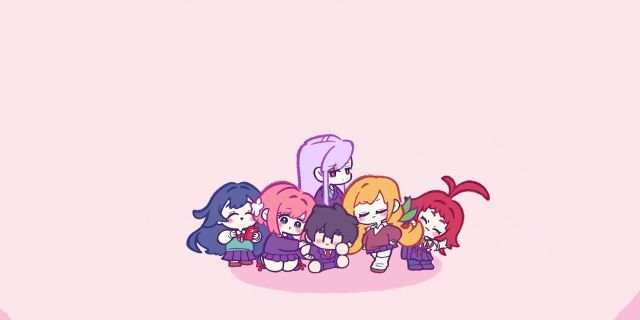Highlights
- The names of the characters in “100 Girlfriends” are puns reflecting their personalities, adding to their charm.
- Hanazono Hakari’s name suggests a flower garden with fragrant feathers stretching for miles, a very elegant name.
- Yoshimoto Shizuka’s name signifies a tranquil silence from which goodness emerges, representing her quiet kindness.
One of the Fall 2023 anime season’s breakout titles is the hilarious 100 Girlfriends Who Really, Really, Really, Really, Really Love You; often shortened to “Hyakkano” or 100 Girlfriends. What makes it so great is its cast of characters, particularly the girlfriends who are in a polyamorous relationship with the protagonist, Rentarō Aijō.
In classic anime fashion, the characters’ names are actually puns that are reflective of some major facet of their personality, which only adds to their charm. So, what are the puns behind the names of the first five girlfriends introduced in 100 Girlfriends Who Really, Really, Really, Really, Really Love You?
RELATED: The 100 Girlfriends Who Really, Really, Really, Really, Really Love You: What to Expect From Season 1 (According to the Manga)
Hanazono Hakari

Hakari is, along with Karane, the first of Rentarō’s girlfriends, and to that end, she and Karane have established a close friendship even though it seems like they are constantly in competition. The family name “Hanazono” is written 花園, with the kanji for “flower” and “garden”, while the first name “Hakari” is written 羽香里, with kanji for “feather” or “wing” depending on context, “fragrance”, and “ri”; the old Japanese unit of distance equivalent to 3.927 km or 2.44 miles. Together, the name “Hanazono Hakari” gives the concept of a flower garden arranged in a way that gives the impression of fragrant feathers stretching out for miles, which is an incredibly elegant name. The “-kari” in Hakari would on its own be the familiar Japanese name “Kaori”, although that name is often written with a different kanji, or just the hiragana “-ru” or “ri” (masculine or feminine) after the kanji for fragrance. Hakari’s name is also referenced in the character’s accessories, which are flower hairpins.
Inda Karane

Karane is, along with Hakari, the first of Rentarō’s girlfriends, and to that end, she and Karane have established a close friendship even though it seems like they are constantly in competition. The last name “Inda” is written 院田, with the first kanji often used in reference to medical institutions, and the last being rice paddy or field. The first name “Karane” is written 唐音, and the first kanji’s meaning here is rather difficult to pin down. Going with the pronunciation “kara”, the kanji has an archaic definition referring to the T’ang Dynasty of China (618-907CE); however, the kanji is also the “dou-” in the word “dougarashi”, which is written 唐辛子 and refers to capsicum, commonly known as chilies or peppers.
The second kanji in “Karane” can be translated as either “sound” or “musical note”, which may grant more context to the intended meaning of the first kanji. In the case of the “-ne” in Karane meaning “sound”, the translation of the first kanji could be from one meaning derived from the aforementioned. Another archaic term for that which is exotic, the “Kara-” in Karane was primarily used in reference to goods from China. Perhaps a less literal understanding of Karane’s first name would be something akin to “exotic note”, but given that the first kanji in her name is also used as part of a word that means “sudden”, it could also be a reference to the way she loudly interjects in conversation, or to the fact that she’s rather spirited and sometimes a little violent.
Yoshimoto Shizuka

Shizuka has a very straight-forward name pun. The family name, Yoshimoto, is written 好本, while her first name is written 静. The first kanji in Yoshimoto is the operative kanji used in the word 好き “suki”, meaning to like, be fond of or prefer; or in this case, “good”; while the second is the character for “book”, which can also be read as “source” or “root” of something. For example, “Yamamoto” is often written with the kanji for mountain, and the aforementioned; translating directly to “base of the mountain”. With the reading of the kanji as “yoshi-” and “-moto” in Shizuka’s case, the idea is more aligned with the character being “where good things come from”; however, the kanji themselves can also be read as “fondness” and “book”, illustrating Shizuka’s defining trait. Together, “Yoshimoto Shizuka” communicates a tranquil silence from which pleasure or goodness can arise; giving the sense of quiet kindness.
Eiai Nano

Given her obsession with efficiency and perfection, particularly in a purely mathematical sense, Nano Eiai is the fourth girlfriend. Her last name, Eiai is written 栄逢, with the first kanji translating to glory, honour, or prosperity in an archaic sense. The second kanji in “Eiai” is pronounced the same way as 会い, read “ai”, meaning “to see” or “to meet”. The kanji used in Nano’s last name is actually a variant of the aforementioned, with a specific contextual meaning: the clandestine meeting of lovers. Her first name, Nano, is written 凪乃, with kanji for “lull” (as in, to bring to a calm), which fits her as a kuudere. The last kanji is an interesting one, because it’s an archaic form of the particle の “no”, which is used to denote possession much like an apostrophe -s would in English. Due to it being an old usage, the kanji isn’t commonly seen outside its use in names.
The pun comes in when the whole name is read out in Japanese: “Eiai Nano”, which sounds like「 AI なの ?」–”AI nano?”– “is she an AI?”, which is the question many of her classmates ask themselves when met with her extremely calculating, logical and efficiency-centered outlook on life; her ambition, as well as her blank facial expression and monotonous manner of speaking that are all seen as robotic. This is a common experience for autistic people, and that is relevant because the girlfriend before Nano is a non-verbal bibliophile with a vested interest in books; Nano is like her mathematical, straight-forward counterpart, and a kuudere at that.
Yakuzen Kusuri

The fifth girlfriend introduced in 100 Girlfriends is Kusuri Yakuzen, who, like the previous two, has a name that is reflective of her personality and special interests. Her family name is written 薬膳, with the kanji for “medicine” or “pharmaceuticals” followed by one that refers to a small dining table, so the name “Yakuzen” is to the effect of “a small dining table of drugs”, which sounds like a nod to Kusuri’s small size and her obsession with pharmaceuticals, chemistry and the like. Her first name is written 楠莉, combining the kanji for the camphor tree – “kusunoki” in Japanese – with that of another plant, jasmine.
Camphor has huge historical significance as a medicine distilled from extracts taken from the wood of camphor trees, while the flowers of Jasminum are used to flavour food and drink, as well as grant fragrance to perfumes, and medicinally as a balm that promotes healing. Together, Yakuzen Kusuri gives the image of a small tray of medicines derived from healing plants like camphor and jasmine. However, “kusuri” is also a pronunciation of the first kanji in her family name, meaning “medicine”, giving rise to her name’s double entendre while also assigning a floral quality to her name.
Bonus: Aijō Rentarō

The main character of 100 Girlfriends Who Really, Really, Really, Really, Really Loves You has a very interesting name given his romantic situation and outlook. His last name is written 愛城, with the kanji “ai”, meaning love; however, the variant of love in this case isn’t used casually. It communicates a pure form of love, levels beyond the commonly used “suki“, or its superlative “daisuki“, used to communicate feelings of fondness. The second kanji in “Aijō” is the character meaning “castle”, making Rentarō’s last name translate to something akin to “love castle”, but the pun comes in when one realizes that it also happens to be a homophone – “aijō” is written 愛情, with the same first kanji as Rentarō’s last name, but followed by a character that invokes the idea of a set of circumstances, state of affairs, a concept or sentiment. The last kanji in this case does the same work done by the English suffix “-ship”, as in “relationship”, “friendship”, etc.
Rentarō is written 恋太郎, with the first kanji being used to specifically denote romantic love. On its own, 恋 is pronounced “koi“, and when followed by the kanji for “person”, one gets “koibito“, literally “lover”; however, this kanji is often followed by the aforementioned “ai“, like this 恋愛, creating the word “ren’ai” – the concept of romantic passion, falling in love and the like. The second kanji in Rentarō is 太, translating to “thick”, or more metaphorically, “great” or “auspicious”. The last kanji is what assigns masculinity to the name, similarly to how 子, “-ko“, is used to assign femininity to a name. “Rentarō” altogether gives us the image of a great romantic lover, and the auspiciousness assigned by the second kanji fits in with the last name translating to “love castle” while playing on the abstraction or concept of love. Rentarō lives up to his name through his romance-focused personality, charm and genuine care for his girlfriends.
The 100 Girlfriends Who Really, Really, Really, Really, Really Love You is available to stream on Crunchyroll.











Leave a Reply